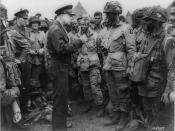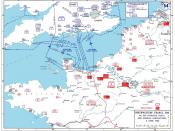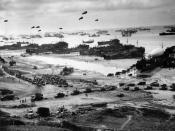The Climatic Battle on the Beaches of Normandy
"Almighty God- Our sons, pride of our nation, this day have set upon a mighty endeavor." On the eve of D-day in the year 1944, these were the words spoken by Franklin Roosevelt, asking for the safety of our men fighting in one of the greatest battles in American history. This battle took place on the beaches of northern France on June 6, 1944. This battle was not only great, but decisive. It was a major turning point in World War II. This attack would be the starting point for a massive Allied attack in central Europe, and moving east to Germany. This attack would also bring an end to German occupation of Western Europe and stop the powerful nation from taking over the entire continent. Without direct intervention by the western Allies on the continent--an intervention that would center on the commitment of a large American army--Hitler could count on prolonging his military dominance for years to come.
The question lies in how this one massive attack could change the tide and outcome of a world war.
At the beginning of 1944 Nazi Germany occupied far much more land in Europe than it could defend. Even still, Germany continued to build fortifications along the French coast in order to stop any attack from the English Channel. Hitler had decided that along this coast the decisive battle would indeed be fought. The Russian counteroffensive at Stalingrad had pushed backed Hitler's control in Eastern Europe, but he still retained much of the mainland. Two years before the Normandy invasion, Russia's leader, Joseph Stalin, had been pushing the British and Americans to mount a "second front" in the west. This at the time seemed inconceivable.
The Americans, however inconceivable it may have seemed, supported...


